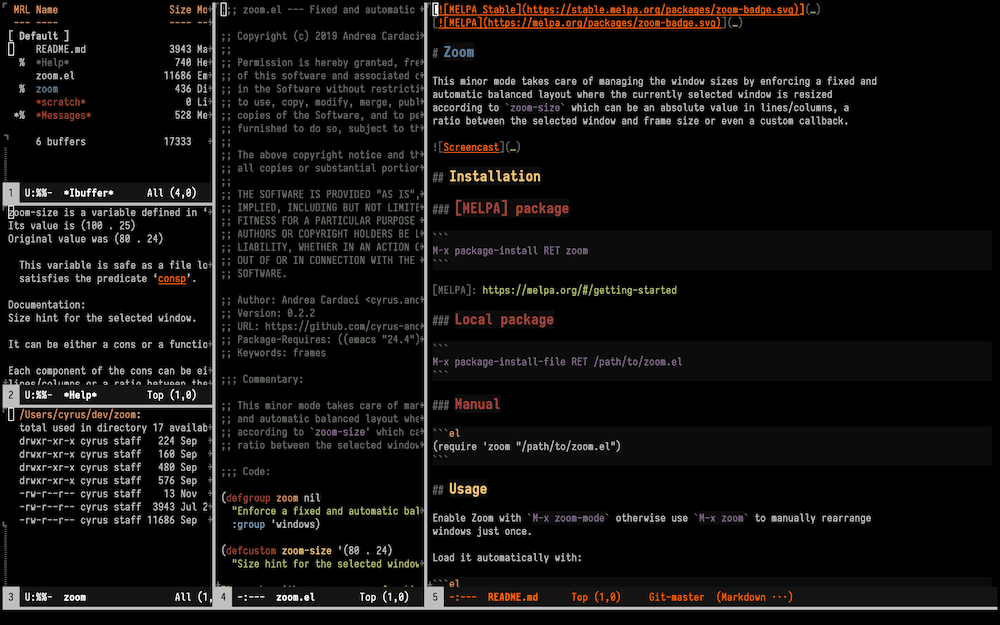This minor mode takes care of managing the window sizes by enforcing a fixed and
automatic balanced layout where the currently selected window is resized
according to zoom-size which can be an absolute value in lines/columns, a
ratio between the selected window and frame size or even a custom callback.
MELPA package
M-x package-install RET zoom
M-x package-install-file RET /path/to/zoom.el
(require 'zoom "/path/to/zoom.el")Enable Zoom with M-x zoom-mode otherwise use M-x zoom to manually rearrange
windows just once.
Load it automatically with:
(custom-set-variables
'(zoom-mode t))See the FAQ.
For a complete reference see M-x customize-group RET zoom.
Resize the selected window using the golden ratio:
(custom-set-variables
'(zoom-size '(0.618 . 0.618)))Resize the selected window according to the frame width, for example:
- 90 columns and 75% of the frame height if the frame width is larger than 1024 pixels;
- half the frame size otherwise.
(defun size-callback ()
(cond ((> (frame-pixel-width) 1280) '(90 . 0.75))
(t '(0.5 . 0.5))))
(custom-set-variables
'(zoom-size 'size-callback))Override the key binding of balance-windows:
(global-set-key (kbd "C-x +") 'zoom)Prevent some windows from being resized, for example:
diredandmarkdownmajor modes;zoom.elinit.elbuffer names;- calculator-related windows;
- any buffer containing less than 20 lines.
(custom-set-variables
'(zoom-ignored-major-modes '(dired-mode markdown-mode))
'(zoom-ignored-buffer-names '("zoom.el" "init.el"))
'(zoom-ignored-buffer-name-regexps '("^*calc"))
'(zoom-ignore-predicates '((lambda () (> (count-lines (point-min) (point-max)) 20)))))(Please note that ignored windows are not resized when selected but all the
windows are nevertheless arranged with balance-windows.)
What about golden-ratio.el?
I have been a more or less happy golden-ratio.el user for some time when I
stared noticing some bugs and sadly I discovered that it is apparently a dead
project now, so I decided to write a new and improved minor mode from scratch
that implements the same basic idea of automatic window layout as my first
attempt at Emacs mode development.
This happens when zoom-minibuffer-preserve-layout is non-nil (the default)
because most of the space is probably occupied by the zoomed window. The
solution (apart from setting the aforementioned variable to nil) is to enable
the temp-buffer-resize-mode minor mode:
(custom-set-variables
'(temp-buffer-resize-mode t))When a window is ignored it is simply not resized when the user selects it.
In order to maintain a stable layout, windows are always balanced, then the selected window, unless ignored, is zoomed according to the user preference.
This may cause weird layouts with windows that are designed to be small, e.g.,
imenu-list. Unfortunately there is no universal solution to this.
The workaround is to set window-size-fixed to t for the buffers whose window
must preserve the current size, for example the following fixes the size of the
imenu-list window to 30 columns:
(defun my/fix-imenu-size ()
(with-selected-window (get-buffer-window "*Ilist*")
(setq window-size-fixed t)
(window-resize (selected-window) (- 30 (window-total-width)) t t)))
(add-hook 'imenu-list-update-hook 'my/fix-imenu-size)












